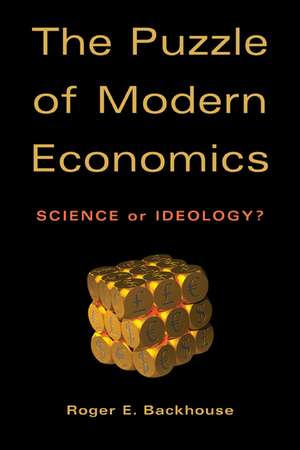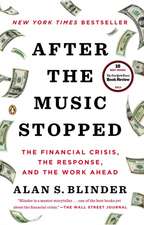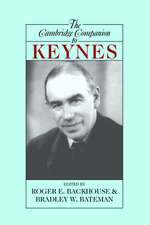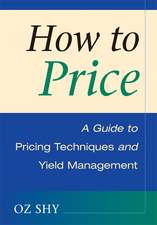The Puzzle of Modern Economics: Science or Ideology?
Autor Roger E. Backhouseen Limba Engleză Paperback – 20 iun 2010
| Toate formatele și edițiile | Preț | Express |
|---|---|---|
| Paperback (1) | 258.96 lei 6-8 săpt. | |
| Cambridge University Press – 20 iun 2010 | 258.96 lei 6-8 săpt. | |
| Hardback (1) | 522.47 lei 6-8 săpt. | |
| Cambridge University Press – 20 iun 2010 | 522.47 lei 6-8 săpt. |
Preț: 258.96 lei
Nou
Puncte Express: 388
Preț estimativ în valută:
49.56€ • 51.54$ • 41.47£
49.56€ • 51.54$ • 41.47£
Carte tipărită la comandă
Livrare economică 15-29 martie
Preluare comenzi: 021 569.72.76
Specificații
ISBN-13: 9780521532617
ISBN-10: 0521532612
Pagini: 214
Ilustrații: 2 b/w illus. 1 table
Dimensiuni: 152 x 226 x 15 mm
Greutate: 0.34 kg
Editura: Cambridge University Press
Colecția Cambridge University Press
Locul publicării:New York, United States
ISBN-10: 0521532612
Pagini: 214
Ilustrații: 2 b/w illus. 1 table
Dimensiuni: 152 x 226 x 15 mm
Greutate: 0.34 kg
Editura: Cambridge University Press
Colecția Cambridge University Press
Locul publicării:New York, United States
Cuprins
1. Introduction; Part I. Economics in Action: 2. Creating new markets; 3. Creating a market economy; 4. Globalization and welfare; 5. Money and finance; Part II. Historical Perspectives: 6. Creating a 'scientific' economics; 7. The quest for rigorous macroeconomics; 8. Science and ideology; 9. Heterodoxy and dissent; Part III. Evaluation: 10. Economic science and economic myth; Supplementary note on the literature.
Recenzii
'This perceptive guide to the state of conventional economics in the aftermath of the financial crisis shows the subject is neither as flawed as its critics claim nor as powerful as its defenders say. Importantly, Roger Backhouse helps us understand when we can rely on the standard tools of economics. In clearly defined situations, economic models - applied with good judgment - do help tackle real-world problems, but economic techniques are less useful in addressing more complex problems. This is a wise book, one both economists and their critics would do well to read.' Diane Coyle, author of The Soulful Science: What Economists Really Do and Why It Matters
'This beautifully written and extraordinarily insightful book will fascinate anyone interested in macroeconomics, regardless of theoretical or political orientation. Roger Backhouse is one of the few economists in the world with the breadth and depth of knowledge, acuteness of judgment, and intellectual integrity to undertake a systematic and unprejudiced evaluation of the strengths and limitations of modern economics in providing understanding of phenomena ranging from globalization to the recent financial crisis. Academic economists of various stripes will frequently disagree with aspects of Backhouse's analysis but will never fail to be stimulated and sometimes challenged. Lay readers will find the book a rewarding entry into many of the key macroeconomic debates. Simply put, The Puzzle of Modern Economics is an intellectual delight.' Steven N. Durlauf, University of Wisconsin
'It is refreshing to find someone who sees the status of modern economics as a puzzle rather than as either a capitalist plot or the triumph of pure reason. Backhouse tries to focus on the intrinsic difficulty of making and applying theories when their object is something as complicated and variable as a modern economy. That is where the action is and where the thought should be.' Robert Solow, Massachusetts Institute of Technology and Nobel Laureate
'This is a tour de force. It presents for the general reader as much as for the specialist a judicious account of why the tribes of economists often reach different conclusions about the same events and offer different prescriptions for the same problems. And it explains why the tribes with a substantially unjustified faith in free markets have long been in the ascendancy, which may now be coming to an end.' Robert Wade, London School of Economics and Recipient of the Leontief Prize in Economics, 2008
'Does present-day economics make sense? In a half-dozen well-chosen case studies, Roger Backhouse takes the reader on a tour d'horizon of developments since World War II in order to ask: Is it a) dangerous mathematical formalism, b) free market ideology, or c) a vital guide to practical action? The correct answer, he concludes, is d) all of the above.' David Warsh, Economic Principals
'This beautifully written and extraordinarily insightful book will fascinate anyone interested in macroeconomics, regardless of theoretical or political orientation. Roger Backhouse is one of the few economists in the world with the breadth and depth of knowledge, acuteness of judgment, and intellectual integrity to undertake a systematic and unprejudiced evaluation of the strengths and limitations of modern economics in providing understanding of phenomena ranging from globalization to the recent financial crisis. Academic economists of various stripes will frequently disagree with aspects of Backhouse's analysis but will never fail to be stimulated and sometimes challenged. Lay readers will find the book a rewarding entry into many of the key macroeconomic debates. Simply put, The Puzzle of Modern Economics is an intellectual delight.' Steven N. Durlauf, University of Wisconsin
'It is refreshing to find someone who sees the status of modern economics as a puzzle rather than as either a capitalist plot or the triumph of pure reason. Backhouse tries to focus on the intrinsic difficulty of making and applying theories when their object is something as complicated and variable as a modern economy. That is where the action is and where the thought should be.' Robert Solow, Massachusetts Institute of Technology and Nobel Laureate
'This is a tour de force. It presents for the general reader as much as for the specialist a judicious account of why the tribes of economists often reach different conclusions about the same events and offer different prescriptions for the same problems. And it explains why the tribes with a substantially unjustified faith in free markets have long been in the ascendancy, which may now be coming to an end.' Robert Wade, London School of Economics and Recipient of the Leontief Prize in Economics, 2008
'Does present-day economics make sense? In a half-dozen well-chosen case studies, Roger Backhouse takes the reader on a tour d'horizon of developments since World War II in order to ask: Is it a) dangerous mathematical formalism, b) free market ideology, or c) a vital guide to practical action? The correct answer, he concludes, is d) all of the above.' David Warsh, Economic Principals
Notă biografică
Descriere
This book cuts through the confusion and controversy about whether modern economics has succeeded or failed.









